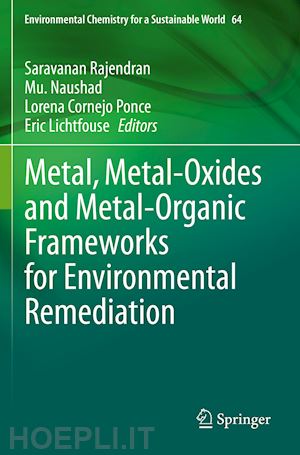
Questo prodotto usufruisce delle SPEDIZIONI GRATIS
selezionando l'opzione Corriere Veloce in fase di ordine.
Pagabile anche con Carta della cultura giovani e del merito, 18App Bonus Cultura e Carta del Docente
This book reviews principles, techniques and applications of metal, metal oxides, metal sulfides and metal-organic frameworks for removal and degradation of pollutants. Natural materials are often much more advanced than synthetic materials in terms of circularity and are functional, often biodegradable, recyclable and generate little waste. They are, therefore, a source of inspiration for new synthetic materials. In particular, recent research has focused on various types of functional materials such as organic, inorganic, nanostructured and composites for the remediation of environmental pollution.
Dr. Saravanan Rajendran has received his Ph.D in Physics-Material Science in 2013 from the Department of Nuclear Physics, University of Madras, Chennai, India. He was awarded the University Research Fellowship (URF) during the year 2009-2011 by the University of Madras. After working as an Assistant Professor in Dhanalakshmi College of Engineering, Chennai, India during the year 2013-2014, he was awarded SERC and CONICYT-FONDECYT post-doctoral fellowship at the University of Chile, Santiago in the year of 2014-2017. He has worked (2017-2018) in the research group of Professor John Irvine, School of Chemistry, University of St Andrews, UK as a Postdoctoral Research Fellow within the framework of an EPSRC-Global Challenges Research Fund for the removal of Blue-Green Algae and their toxins. Currently, he is currently working as a Research Scientist, in the Faculty of Engineering, Department of Mechanical Engineering, University of Tarapacá, Arica, Chile. Also, Research Associate in SERC, Santiago, Chile. He is Associate Editor for the International Journal of Environmental Science and Technology (Springer). His research interests focus on the area of nanostructured functional materials, photophysics, surface chemistry and nanocatalysts for renewable energy and waste water purification. He has published several International peer-reviewed Journals, eight book chapters and seven books published by renowned international publishers.
Dr. Mu. Naushad is presently working as a Full Professor in the Department of Chemistry, College of Science, King Saud University (KSU), Riyadh, Kingdom of Saudi Arabia. He obtained his M.Sc and Ph.D Degree in Analytical Chemistry from Aligarh Muslim University, Aligarh, India in 2002 and 2007, respectively. He has vast research experience in the multidisciplinary fields of Analytical Chemistry, Materials Chemistry and Environmental Science. He holds several US patents,over 380 publications in the international Journals of repute, twenty book chapters and ^15000 citations with a Google Scholar H-Index of >67. He has been included in the list of Highly Cited Researchers 2019 & 2020. He has successfully run several research projects funded by the National Plan for Science and Technology (NPST) and King Abdulaziz City for Science and Technology (KACST), Kingdom of Saudi Arabia. He is the editor/editorial member of several reputed Journals like Scientific Report (Nature); Process Safety & Environmental Protection (Elsevier); Journal of Water Process Engineering (Elsevier) and International Journal of Environmental Research & Public Health (MDPI). He is also the associate editor for Environmental Chemistry Letters (Springer) and Desalination & Water Treatment (Taylor & Francis). He has been awarded the Scientist of the year award-2015 from the National Environmental Science Academy, Delhi, India and Almarai Award-2017, Saudi Arabiaand Best Research Quality award-2019, King Saud University, Saudi Arabia.
Dr. Lorena Cornejo Ponce currently works as a professor in the Department of Mechanical Engineering of the Faculty of Engineering of the University of Tarapacá, Arica, Chile. She obtained her Master's Degree in Chemistry (Analytical Chemistry) and Doctorate (Science-Chemistry) at the State University of Campinas, Campinas-Brazil, in the year 1988-1995. Furthermore, she continued her Post-doctorate at the same University in 1998. She is interested in the field of spectroscopic analysis, environmental issues and new catalysts; she is developing new technology in the area of decontamination, water disinfection and solar water treatment. She published several articles in Wos publications, book chapters, and conference proceedings. She has successfully managed several national and international research projects financed by different governmental and private financing agents such as FONDECYT, FONDAP, FIC, CONICYT, OAS, CYTED. She obtained international recognition awards -2 MERCOSUR (Science and technology-integration category) in the years 2006 and 2011. Likewise, she is the Director of the Environmental Research Laboratory of Arid Zones, LIMZA. In addition, she holds the position of Principal Investigator and Coordinator of Line N ° 1: Solar Water Treatment of SERC-CHILE. In addition, she is the Regional Director of the AYLLU SOLAR Project, Solar Energy: Sustainable Development for Arica and Parinacota, she is also a member of the Steering Committee and Coordinator of the "Solar Water Treatment" area.
Dr. Eric Lichtfouse is a professor of environmental chemistry and scientific writing at Aix Marseille University, France, and Xi’an Jiaotong University, China. He has invented carbon-13 dating, a relative dating method based on the discovery of temporal pools of individual substances in complex environmental media. He has published











Il sito utilizza cookie ed altri strumenti di tracciamento che raccolgono informazioni dal dispositivo dell’utente. Oltre ai cookie tecnici ed analitici aggregati, strettamente necessari per il funzionamento di questo sito web, previo consenso dell’utente possono essere installati cookie di profilazione e marketing e cookie dei social media. Cliccando su “Accetto tutti i cookie” saranno attivate tutte le categorie di cookie. Per accettare solo deterninate categorie di cookie, cliccare invece su “Impostazioni cookie”. Chiudendo il banner o continuando a navigare saranno installati solo cookie tecnici. Per maggiori dettagli, consultare la Cookie Policy.